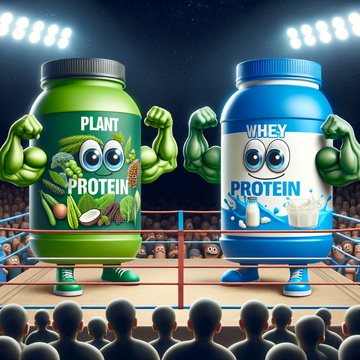
Protein is a powerhouse nutrient, playing an essential role in building and repairing tissues, muscles, bones, and even our skin. It also fuels a myriad of bodily functions. For those looking to supplement their protein intake without relying solely on animal products, the decision often comes down to choosing between whey protein and plant-based alternatives.
Why Your Body Needs Protein
Regardless of whether your goal is muscle gain, strength, or weight loss, protein is a non-negotiable element in your diet. It’s the building block of your muscles, bones, skin, and more, and it's also instrumental in producing enzymes and hormones.
The Recommended Dietary Allowance (RDA) for protein is roughly 0.8 grams per kilogram of body weight. This intake is crucial not only for muscle repair, especially after intense workouts but also for maintaining a healthy metabolism and satiety levels, which can aid in weight management. It even plays a role in helping older adults preserve muscle mass and strength, an important factor in maintaining mobility with age.
Whey Protein: The Dairy Dynamo
Whey protein, a byproduct of cheese-making, has long been the darling of bodybuilders and athletes for its complete amino acid profile—it contains all nine essential amino acids our body needs. It's celebrated for its ability to support muscle building, enhance recovery, and even aid in wound healing. Whey protein is also known for its rapid digestion and absorption, making it a go-to post-workout supplement.
Plant-Based Protein: The Veggie Victor
On the other side, we have plant-based proteins, which have surged in popularity as people seek healthier and more sustainable diets. These proteins come from sources like peas, rice, hemp, and pumpkin plus they offer other health benefits that might be missing from animal-based proteins, such as fiber and phytonutrients.. Unlike whey protein, certain plant-based proteins might not naturally include all essential amino acids.
To ensure you're receiving a complete amino acid profile, it's crucial to select a plant-based protein that is specifically formulated to provide this balance. B Maximum takes pride in offering plant-based protein options that boast robust and comprehensive amino acid profiles, ensuring you get the full range of nutrients your body requires.
Pea Protein: The Legume Leader
Pea protein, specifically, is made from the humble yellow pea, and it stands out in the plant protein crowd. It's rich in branched-chain amino acids (BCAAs), particularly arginine, which is excellent for heart health and circulation. While it may be lower in methionine, combining pea protein with other plant-based proteins can create a complete amino acid profile.
The Verdict
When it comes to building muscle, both whey and plant-based proteins are effective. Studies indicate that pea protein can match whey in muscle thickness and overall strength gains. This is great news for those with dietary restrictions or preferences that lead them away from dairy.
Considerations for Your Choice
Choosing between whey and plant-based protein can depend on a variety of factors, including dietary restrictions, potential allergies, and personal ethics. For those with lactose intolerance or a dairy allergy, plant-based proteins are the clear winner. Conversely, if you're looking for rapid digestion, whey might be your best bet.
Safety and Quality
Both whey and plant-based proteins are considered safe for the general population. However, it's crucial to choose high-quality supplements free from excessive sugars and additives. Always check the labels.
Sustaining Your Health
Whether you choose whey or plant-based protein, the key is to integrate it into a balanced diet. Protein powders should complement your meals, not replace them. A scoop in your morning smoothie or post-workout shake can go a long way in supporting your fitness and health goals.
In conclusion, both whey and plant-based proteins have their place on the podium of nutritional excellence. It ultimately comes down to personal choice, dietary needs, and lifestyle. Whichever you choose, you’ll be fueling your body with the essential nutrient it needs to perform at its best.







